Cuba USA
This post is not about what I think will happen, but to begin discussion of what the Cuban government could do if the goal were to provide a modern, open Internet with affordable (free in some cases?) access.
The Cuban Internet is in a sorry state. Freedom House ranks Cuban Internet freedom 62nd among the 65 nations they survey and the UN International Telecommunications Union ranks Cuban information and communication technology development last among 32 nations in Latin America and the Caribbean.
Historically, there are three primary causes for the sad state of the Cuban Internet -- the US trade embargo, Cuban poverty at the time of their connection to the Internet and the government's fear of information. (We'll discuss a possible new constraint, ETECSA, later).
President Obama has lifted the first barrier and, when we look at other poor Latin America and Caribbean nations, we see that Cuba could afford a better Internet than it currently has.
That leaves fear of an open Internet. The government says the Internet is a priority and they want to expand access as quickly as financially feasible. I am skeptical, but let’s assume they are sincere – what might they do in the short term and the long term?
In the short term
Cuba cannot afford ubiquitous, modern Internet infrastructure today – they need low-cost interim action while planning for the long term. Here are some low-cost ways they could improve the Internet in the short run:
What about the long term?
Long range planning, addressing technology and, more important, infrastructure ownership and regulation policy, should begin immediately.
Cuba has little Internet infrastructure. There is an undersea cable to Venezuela, but little fiber on the island. (Eventually, Cuba might take control of the cable being installed between Guantánamo and Florida). Nearly all home connections are dial-up and the cell network is obsolete 2G technology. There are 573 public access computers in 155 locations, but they are slow and an hour online costs nearly a week’s pay for many workers.
Cuba should leapfrog today’s technology, looking toward developments that are five or more years out – 5G mobile communication, high frequency wireless by Google and others, the satellite constellation projects from SpaceX and OneWeb, connectivity using an undersea cable from Havana and perhaps the one at Guantánamo, etc. Routing traffic using version 6 of the Internet protocol will prepare them for the “Internet of things.”
The long range planning of technology is necessary, but formulating policies for ownership of infrastructure and regulation is more important -- not only for Cubans, but for the rest of the world as well if the Cuban experience leads to innovative policies.
The conventional wisdom is that Cuba should invite foreign companies to install infrastructure – a path many developing nations have followed with marginal success. It is not certain that Cuba, with its current government and weak economy, could attract foreign investment, but even if could, I would hate to see Cuba's Internet future in the hands of companies like AT&T or Orange.
If they do go with foreign investment, I would not be surprised to see them partnering with Google rather than a traditional ISP – Google executives have visited Cuba and Google is clearly interested in global connectivity. My experience in the US leads me to trust Google to do a better job than the incumbent ISPs, but, I would still have to ask -- in the long run, why should we expect Google to be better for the Cuban people than a traditional ISP? (I'd ask the same question of aspiring global satellite ISPs SpaceX and OneWeb).
Cuba should go slowly and consider a broad range of infrastructure ownership policies like municipal ownership in Stockholm, government as a venture capitalist in Singapore, government as rural wholesale backbone provider as in India, individual ownership of final links, etc. Cuban policy makers should consider a broad range of policy models -- Chile, Iceland, Vietnam, Estonia, etc. etc.
In 1997, fear of free speech led the government to squelch the Internet, but today there is another potential stumbling block – ETECSA, Cuba’s monopoly Internet service provider. ETECSA is usually described as a state-owned monopoly, but it’s privately owned by a murky collection of investors (rumored to include Fidel and Raúl Castro) and regulated by the Ministry of Communication.
The relationship between ETECSA and the Ministry is unclear – which organization makes investment decisions, sets prices, gets the profits or absorbs the losses, etc.?
Cynics predict the Cuban Internet will undergo a Soviet-style sell-off to foreign investors who will run it for their profit. But, if the Cuban government sincerely embraces its socialist goals, it has a chance to create a uniquely Cuban Internet with the goal of providing universal, affordable access to its citizens rather than making profit for private ISPs, ETECSA or the government. I’m skeptical, but hope I’m wrong.
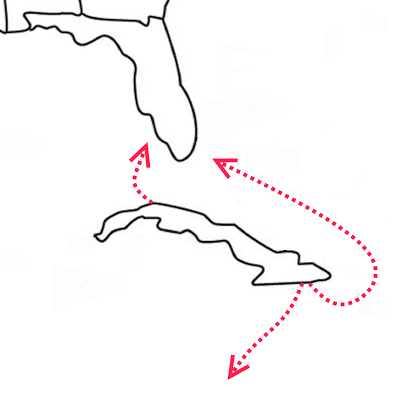
-----
Update 3/18/2015
One of my long-term suggestions was that Cuba keep an eye on OneWeb, which hopes to provide global satellite connectivity. CEO Greg Wyler, speaking at the Satellite 2015 Conference yesterday, said they hope to be offering service by 2019 -- providing $250 ground stations that require no setup and establish a 50 mbps connection to the Internet and a WiFi, LTE, 3G and 2G local area network.
One of my short-term suggestions was that Cuba deploy geostationary satellite ground stations. They could do that today, but, if OneWeb is successful, their satellite links will be cheaper and superior to today's satellite offerings in every way.
Grag Wyler speaking:
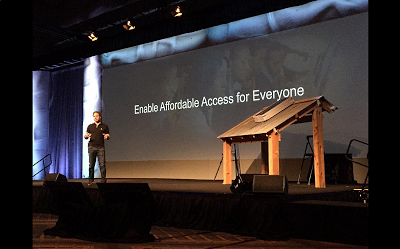
A OneWeb ground station -- no setup required:
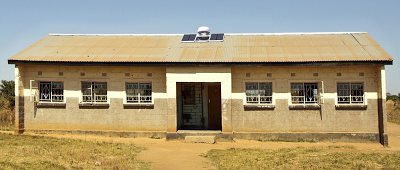
-----
Update 3/22/2015
It seems that Internet access at the University of Santiago de Cuba has been significantly improved. I am being a vague because the post I read has been translated into English and is hard to follow. It sounds like the university now has a fiber link and speed and data caps have improved significantly.
Can someone fill me in on the details of this upgrade and on the general state of connectivity at Cuban universities?
-----
Update 3/28/2015
Ricardo Alarcon, head of the Ministry of Higher Education announced a deal with ETECSA to substantially improve university Internet access. It sounds like every university will have both domestic and international links. The article is vague and inconsistent on technical details, but it also says students will have access to 40,000 digital magazines -- double the previous amount.
The article also refers to an upgrade to the university network, REDUNIV. The figure below was taken from a PowerPoint presentation last updated in 2005. I am saddened to see a frame relay backbone, but I am sure it has been upgraded since that time. Does anyone have information about the current network?
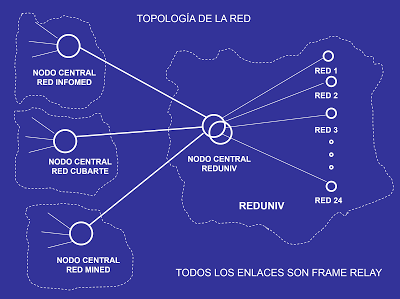
-----
Update 5/11/2015
I suggested that Cuba would be better off owning and controlling their telecommunication infrastructure rather than turning it over to foreign investors and they may be heading in that direction.
Lina Pedraza Rodríguez, Cuban Minister of Finance and Prices, said that Cuba is in "very advanced" negotiations with Huawei at the World Economic Forum on Latin America last week.
Pedraza also said the Cuban telecoms sector would be open to all foreign companies but also noted that the country wanted to avoid the "negative parts of the Internet."
Pedreza also feels that things are moving slowly with the US and called for the elimination of our trade embargo.
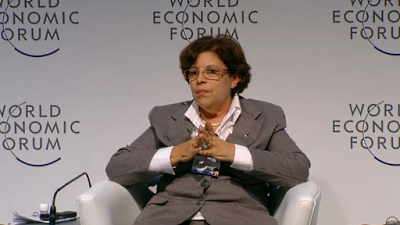
-----
Update 5/28/2015
One of my short-run suggestions was to legitimatize and support shared WiFi hotspots. Raymond J. Delgado Sutil has written a post that elaborates on that suggestion. He estimates that ETECSA's revenue from Internet access "navigation rooms" is around 907,000 CUC per year and the cost of installing WiFi access points at each navigation room and Youth Computer Club location would be about $200,000. Users would use their own computers and phones, eliminating the need for more computers in the navigation rooms. He says ETECSA should "just do it" rather than conducting a "study."
Unfortunately, Delgado does not mention backhaul speed at the navigation rooms or whether they connect to the undersea cable for international traffic. The backhaul speed is only 2 mb/s at the ballyhooed free hotspot of the artist Kcho. At that speed, performance would be very poor whether access was over WiFi or using one of the original hard-wired computers. Similarly, if international access were routed over satellite, response would be very slow.
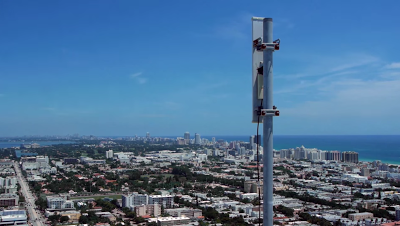
-----
Update 7/16/2015
Raul Castro has reported that Cuba's economy is growing at a 4.7 percent annual rate (due to increased tourism?) and Cuba is "strictly meeting its debt obligations with foreign creditors and suppliers." A stronger economy will enable Cuba to pursue a relatively independent Internet strategy, without excessive reliance on foreign investment.
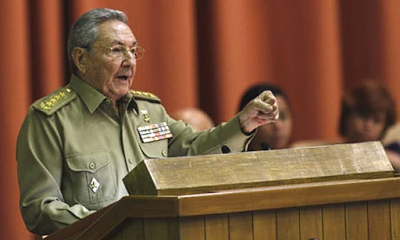
-----
Update 7/18/2015
Speaking at the 10th Congress of the Young Communist League of Cuba, Deputy Minister of Communications Jose Luis Perdomo said they were working on connectivity from homes, lower costs, access from educational, health, scientific, cultural and sport centers as well as industrial, business and service centers.
More concretely, he said they planned provide Internet service to 3G cellular users and deploy WiFi in Havana and provincial capitals. There is little 3G cellular today -- does that mean they plan to extend it? He also said they were deploying IPv6.
-----
Update 11/19/2015
We suggested that Cuba shift to IPv6 and, as the following figure shows, they are routing IPv6 traffic over Tata and Newcomm (satellite) networks, but not Telefonica. I believe the "other" traffic is internal to Cuba -- peering with CENIAI Internet (AS10569).
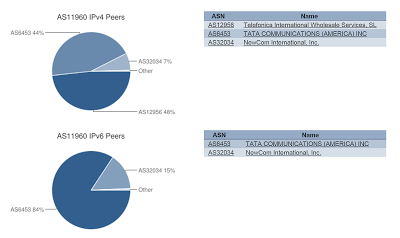
-----
Update 1/17/2016
In considering future technology, infrastructure ownership and policy options, Cuba should look at the experience of others. Steve Song has just posted his annual Africa Telecoms Infrastructure review. The review might provide some insights for Cuban policy makers and they should be consulting with folks like Steve Song.
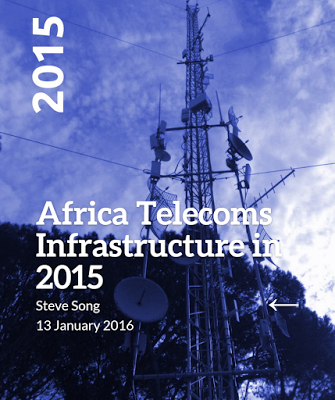
- Year End Interview Of The President Of Etecsa
"The people want to be connected." ETECSA president, ingeniera Mayra Arevich Marín Maya Arevich Marín has been president of ETECSA for four years. The following are a few points from a recent year-end interview. Internet access was improved through...
- Cuban International Traffic Shifts From Satellite To The Alba-1 Undersea Cable
Doug Madory, Director of Internet Analysis at Dyn Research, sent me a note on Cuba's international traffic. As you see here, on July 1, nearly all satellite traffic (blue and green) was re-routed to the ALBA-1 undersea cable: As a result, median...
- Cuba's Wifi Access Plan Raises Intresting Questions.
Do we see the outline of a future national fiber backbone? Luis Manuel Díaz Naranjo, ETECSA Director of Communications, has announced that during the coming weeks, they plan to roll out 35 WiFi access points. As shown here, they will be distributed throughout...
- A High-level Us Delegation Is In Havana To Discuss Telecommunication And The Internet
I hope Cuba's policy is not shaped by political fear or the desire to protect government/ETECSA revenue and that the US delegation is not trying to influence Cuban politics or maximize the profit of US telecommunication companies. Conrad Tribble,...
- A Drop In The Internet Bucket -- Big News Or Not?
Adonis Ortiz chats with his father, who lives in the U.S., using a free Wi-Fi network at a center run by famed artist Kcho, in Havana, (Desmond Boylan/Associated Press) The Cuban artist Kcho received permission from the Cuban telecommunication monopoly...
Cuba USA
The possibility of a uniquely Cuban Internet
This post is not about what I think will happen, but to begin discussion of what the Cuban government could do if the goal were to provide a modern, open Internet with affordable (free in some cases?) access.
The Cuban Internet is in a sorry state. Freedom House ranks Cuban Internet freedom 62nd among the 65 nations they survey and the UN International Telecommunications Union ranks Cuban information and communication technology development last among 32 nations in Latin America and the Caribbean.
Historically, there are three primary causes for the sad state of the Cuban Internet -- the US trade embargo, Cuban poverty at the time of their connection to the Internet and the government's fear of information. (We'll discuss a possible new constraint, ETECSA, later).
President Obama has lifted the first barrier and, when we look at other poor Latin America and Caribbean nations, we see that Cuba could afford a better Internet than it currently has.
That leaves fear of an open Internet. The government says the Internet is a priority and they want to expand access as quickly as financially feasible. I am skeptical, but let’s assume they are sincere – what might they do in the short term and the long term?
In the short term
Cuba cannot afford ubiquitous, modern Internet infrastructure today – they need low-cost interim action while planning for the long term. Here are some low-cost ways they could improve the Internet in the short run:
- Run a pilot study using the same sort of satellite equipment that Alan Gross was arrested for bringing into the country and, If successful, follow with a national roll out – with access points marketed and supported by Cuba’s recently-legal small business people.
- Equip central offices with equipment to upgrade dial-up to DSL accounts.
- Use terrestrial wireless links to establish points of presence in rural locations.
- Legitimatize and support local WiFi hotspots. There are many illegal WiFi networks in Cuba that could be legalized, linked (USENET style, asynchronously) and encouraged.
- Legitimatize and support the weekly “packages” of movies, TV series episodes, magazines and software that are distributed by independent vendors on flash drives. (This would requires some kind of copyright agreement).
- Provide high-speed connectivity to universities and the medical network over the ALBA-1 undersea cable.
- Begin networking of Cuban schools and improve connectivity at the Youth Computer Clubs
- Legitimatize and support the development and export of Cuban software and software services.
- Encourage and support the establishment of a vital startup community.
What about the long term?
Long range planning, addressing technology and, more important, infrastructure ownership and regulation policy, should begin immediately.
Cuba has little Internet infrastructure. There is an undersea cable to Venezuela, but little fiber on the island. (Eventually, Cuba might take control of the cable being installed between Guantánamo and Florida). Nearly all home connections are dial-up and the cell network is obsolete 2G technology. There are 573 public access computers in 155 locations, but they are slow and an hour online costs nearly a week’s pay for many workers.
Cuba should leapfrog today’s technology, looking toward developments that are five or more years out – 5G mobile communication, high frequency wireless by Google and others, the satellite constellation projects from SpaceX and OneWeb, connectivity using an undersea cable from Havana and perhaps the one at Guantánamo, etc. Routing traffic using version 6 of the Internet protocol will prepare them for the “Internet of things.”
The long range planning of technology is necessary, but formulating policies for ownership of infrastructure and regulation is more important -- not only for Cubans, but for the rest of the world as well if the Cuban experience leads to innovative policies.
The conventional wisdom is that Cuba should invite foreign companies to install infrastructure – a path many developing nations have followed with marginal success. It is not certain that Cuba, with its current government and weak economy, could attract foreign investment, but even if could, I would hate to see Cuba's Internet future in the hands of companies like AT&T or Orange.
If they do go with foreign investment, I would not be surprised to see them partnering with Google rather than a traditional ISP – Google executives have visited Cuba and Google is clearly interested in global connectivity. My experience in the US leads me to trust Google to do a better job than the incumbent ISPs, but, I would still have to ask -- in the long run, why should we expect Google to be better for the Cuban people than a traditional ISP? (I'd ask the same question of aspiring global satellite ISPs SpaceX and OneWeb).
Cuba should go slowly and consider a broad range of infrastructure ownership policies like municipal ownership in Stockholm, government as a venture capitalist in Singapore, government as rural wholesale backbone provider as in India, individual ownership of final links, etc. Cuban policy makers should consider a broad range of policy models -- Chile, Iceland, Vietnam, Estonia, etc. etc.
In 1997, fear of free speech led the government to squelch the Internet, but today there is another potential stumbling block – ETECSA, Cuba’s monopoly Internet service provider. ETECSA is usually described as a state-owned monopoly, but it’s privately owned by a murky collection of investors (rumored to include Fidel and Raúl Castro) and regulated by the Ministry of Communication.
The relationship between ETECSA and the Ministry is unclear – which organization makes investment decisions, sets prices, gets the profits or absorbs the losses, etc.?
Cynics predict the Cuban Internet will undergo a Soviet-style sell-off to foreign investors who will run it for their profit. But, if the Cuban government sincerely embraces its socialist goals, it has a chance to create a uniquely Cuban Internet with the goal of providing universal, affordable access to its citizens rather than making profit for private ISPs, ETECSA or the government. I’m skeptical, but hope I’m wrong.

-----
Update 3/18/2015
One of my long-term suggestions was that Cuba keep an eye on OneWeb, which hopes to provide global satellite connectivity. CEO Greg Wyler, speaking at the Satellite 2015 Conference yesterday, said they hope to be offering service by 2019 -- providing $250 ground stations that require no setup and establish a 50 mbps connection to the Internet and a WiFi, LTE, 3G and 2G local area network.
One of my short-term suggestions was that Cuba deploy geostationary satellite ground stations. They could do that today, but, if OneWeb is successful, their satellite links will be cheaper and superior to today's satellite offerings in every way.
Grag Wyler speaking:

A OneWeb ground station -- no setup required:

-----
Update 3/22/2015
It seems that Internet access at the University of Santiago de Cuba has been significantly improved. I am being a vague because the post I read has been translated into English and is hard to follow. It sounds like the university now has a fiber link and speed and data caps have improved significantly.
Can someone fill me in on the details of this upgrade and on the general state of connectivity at Cuban universities?
-----
Update 3/28/2015
Ricardo Alarcon, head of the Ministry of Higher Education announced a deal with ETECSA to substantially improve university Internet access. It sounds like every university will have both domestic and international links. The article is vague and inconsistent on technical details, but it also says students will have access to 40,000 digital magazines -- double the previous amount.
The article also refers to an upgrade to the university network, REDUNIV. The figure below was taken from a PowerPoint presentation last updated in 2005. I am saddened to see a frame relay backbone, but I am sure it has been upgraded since that time. Does anyone have information about the current network?

-----
Update 5/11/2015
I suggested that Cuba would be better off owning and controlling their telecommunication infrastructure rather than turning it over to foreign investors and they may be heading in that direction.
Lina Pedraza Rodríguez, Cuban Minister of Finance and Prices, said that Cuba is in "very advanced" negotiations with Huawei at the World Economic Forum on Latin America last week.
Pedraza also said the Cuban telecoms sector would be open to all foreign companies but also noted that the country wanted to avoid the "negative parts of the Internet."
Pedreza also feels that things are moving slowly with the US and called for the elimination of our trade embargo.

-----
Update 5/28/2015
One of my short-run suggestions was to legitimatize and support shared WiFi hotspots. Raymond J. Delgado Sutil has written a post that elaborates on that suggestion. He estimates that ETECSA's revenue from Internet access "navigation rooms" is around 907,000 CUC per year and the cost of installing WiFi access points at each navigation room and Youth Computer Club location would be about $200,000. Users would use their own computers and phones, eliminating the need for more computers in the navigation rooms. He says ETECSA should "just do it" rather than conducting a "study."
Unfortunately, Delgado does not mention backhaul speed at the navigation rooms or whether they connect to the undersea cable for international traffic. The backhaul speed is only 2 mb/s at the ballyhooed free hotspot of the artist Kcho. At that speed, performance would be very poor whether access was over WiFi or using one of the original hard-wired computers. Similarly, if international access were routed over satellite, response would be very slow.

-----
Update 7/16/2015
Raul Castro has reported that Cuba's economy is growing at a 4.7 percent annual rate (due to increased tourism?) and Cuba is "strictly meeting its debt obligations with foreign creditors and suppliers." A stronger economy will enable Cuba to pursue a relatively independent Internet strategy, without excessive reliance on foreign investment.

-----
Update 7/18/2015
Speaking at the 10th Congress of the Young Communist League of Cuba, Deputy Minister of Communications Jose Luis Perdomo said they were working on connectivity from homes, lower costs, access from educational, health, scientific, cultural and sport centers as well as industrial, business and service centers.
More concretely, he said they planned provide Internet service to 3G cellular users and deploy WiFi in Havana and provincial capitals. There is little 3G cellular today -- does that mean they plan to extend it? He also said they were deploying IPv6.
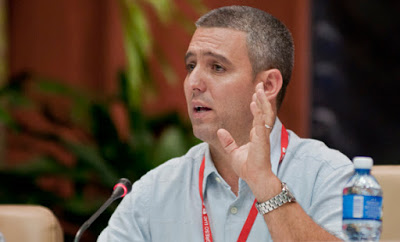 |
| Deputy Minister of Communications Jose Luis Perdomo |
-----
Update 11/19/2015
We suggested that Cuba shift to IPv6 and, as the following figure shows, they are routing IPv6 traffic over Tata and Newcomm (satellite) networks, but not Telefonica. I believe the "other" traffic is internal to Cuba -- peering with CENIAI Internet (AS10569).

-----
Update 1/17/2016
In considering future technology, infrastructure ownership and policy options, Cuba should look at the experience of others. Steve Song has just posted his annual Africa Telecoms Infrastructure review. The review might provide some insights for Cuban policy makers and they should be consulting with folks like Steve Song.

- Year End Interview Of The President Of Etecsa
"The people want to be connected." ETECSA president, ingeniera Mayra Arevich Marín Maya Arevich Marín has been president of ETECSA for four years. The following are a few points from a recent year-end interview. Internet access was improved through...
- Cuban International Traffic Shifts From Satellite To The Alba-1 Undersea Cable
Doug Madory, Director of Internet Analysis at Dyn Research, sent me a note on Cuba's international traffic. As you see here, on July 1, nearly all satellite traffic (blue and green) was re-routed to the ALBA-1 undersea cable: As a result, median...
- Cuba's Wifi Access Plan Raises Intresting Questions.
Do we see the outline of a future national fiber backbone? Luis Manuel Díaz Naranjo, ETECSA Director of Communications, has announced that during the coming weeks, they plan to roll out 35 WiFi access points. As shown here, they will be distributed throughout...
- A High-level Us Delegation Is In Havana To Discuss Telecommunication And The Internet
I hope Cuba's policy is not shaped by political fear or the desire to protect government/ETECSA revenue and that the US delegation is not trying to influence Cuban politics or maximize the profit of US telecommunication companies. Conrad Tribble,...
- A Drop In The Internet Bucket -- Big News Or Not?
Adonis Ortiz chats with his father, who lives in the U.S., using a free Wi-Fi network at a center run by famed artist Kcho, in Havana, (Desmond Boylan/Associated Press) The Cuban artist Kcho received permission from the Cuban telecommunication monopoly...
